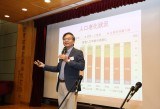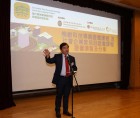Gerontechnology showcase on campus
To promote gerontechnology in Hong Kong and raise public awareness of smart ageing and technological innovations, The Hong Kong Jockey Club Charities Trust is underwriting Lingnan University’s LU Jockey Club Gerontechnology and Smart Ageing Project for three years.
A public seminar ‘Gerontechnology Development Blueprint’ was held on 28 June to examine how different industries tackle the challenge of an ageing population.
Dr Lam Ching-choi, Chairman of the Elderly Commission, Ms Imelda Chan, Head of Charities (Grant Making – Elderly and Family), The Hong Kong Jockey Club, Prof Joshua Mok Ka-ho, Vice-President of Lingnan University, and representatives from several social enterprises were invited to discuss the latest innovations in the field of gerontechnology.
In his welcome speech, Prof Joshua Mok Ka-ho stressed that Hong Kong’s elderly care service is under increasing strain due to the soaring senior population.
He said, “We should think how to apply gerontechnology in healthcare, dining, living and transport in order to enhance the quality of life of the elderly in care homes, in the community, and at home.
“Lingnan is delighted to have received this donation from The Hong Kong Jockey Club Charities Trust to launch the LU Jockey Club Gerontechnology and Smart Ageing Project. We will build a gerontechnology lab on the campus to showcase gerontech products, promote awareness among the elderly, and provide hands-on experience of how gerontech products can change their lives for the better.”
Dr Lam Ching-choi gave a speech pointing out that gerontechnology is a combination of elderly care services and technological advancement in response to the issues presented by an ageing population. The entire world is researching and developing technological solutions to improve care for the elderly, enhance their quality of life, and provide much needed relief for carers and nursing professionals.
Although the HKSAR government promotes the integration of innovations in technology in the elderly care sector in response to the needs of an ageing population, Dr Lam noted that cross-sectoral collaboration is also vital in the funding of gerontechnology and the development of the relevant infrastructure.
“Only when the government, the private sector, the community and academia all play their part will Hong Kong achieve sustainability in elderly care services,” he said.
The seminar also featured a mobile gerontechnology lab where participants could experience what gerontechnology can do for them and learn more about gerontech products.
Seminar emcee, Wong Yiu-fai, introduced a varied display of gerontech devices, saying “Apart from my garment and wine businesses, I spend much time volunteering in hospitals in the New Territories West and Hong Kong East, where I first came across gerontechnology.”
A "dual" student at Lingnan, not only does Wong participate in the LingnanU Elder Academy Programme, but he has also completed the LU Jockey Club Gerontechnology and Smart Ageing Project Gerontechnology Practitioner Training Courses as a gerontech ambassador.
“The course benefits everyone after all, in the sense that I can pass on what I have learned to others and help improve living standards of the elderly with gerontechnology. ‘Caretaking’ is an urge among the elders and, when nursing is understaffed, gerontechnology helps fill the gap as an important auxiliary,” he said.
Another gerontech practitioner, Ling Tang Oi-lan, also graduated from the Lingnan training course, and is fascinated by how practical and well deployed gerontech products are in daily life.
“Due to problems swallowing, some people have difficulty taking an entire pill. Gerontechnology helps with a multifunctional storage box for pills, able to grind pills into powder that goes with water more easily, cutting pills in half in seconds as a dose, and integrating a smart reminder system with a pre-set alarm. Portable, user-friendly and affordable, these devices are becoming popular.”
The lab showcased an interesting range of products, demonstrating how gerontechnology can be incorporated into everyday life.
“I am particularly amused by the ‘buttoning tool’. Aged fingers may not be flexible enough to perform a handy act like buttoning a shirt. This tool somehow gives the elderly an autonomy and ability to solve trivial problems on their own,” a visitor, Mrs Yip, said.
The public seminar is part of the three-year LU Jockey Club Gerontechnology and Smart Ageing Project (2019-2022) nominated by ‘The Chief Executive’s Community Project List’ and funded by The Hong Kong Jockey Club Charities Trust.
The project serves as an educational platform to offer initiatives on ‘Gerontechnology in Healthcare, Dining, Living and Transport’ and to train professionals in gerontechnology. Baseline studies will also be conducted in order to build a database of gerontech products and services, social innovations and start-ups, which provide farsighted policy recommendations to the industry and the government.




